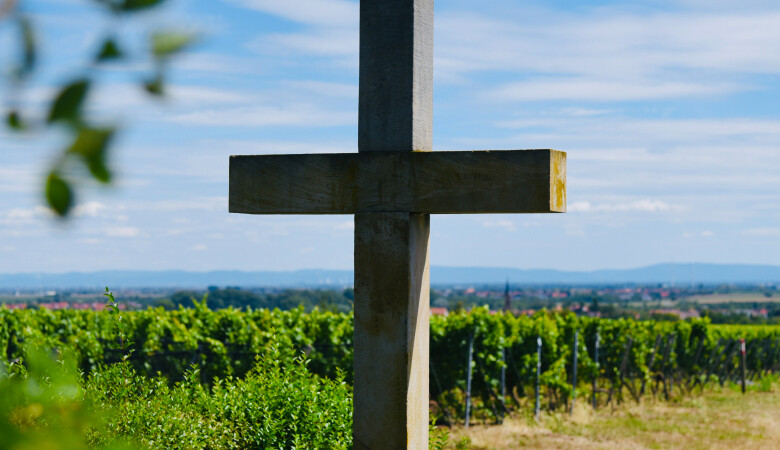God With Us
December 17, 2006 | Andy Davis
Matthew 1:18-25
Incarnation
Pastor Andy Davis preaches a verse-by-verse expository sermon on Matthew 1:18-25. The main subject of the sermon is how Jesus, who is God over all, came to us in human flesh.
- SERMON TRANSCRIPT -
What did Enoch experience? He who is seventh from Adam, when he walked with God and then suddenly was no more, and they looked for him, but they couldn't find him, because God had taken him without death. What did he experience? What did Abraham experience, as the friend of God? So he was called, as he looked up in the starry night sky and heard the promise from God's own mouth, “So shall your offspring be.” And Abraham believed God and it was credited to him as righteousness. What did he experience later, when he entertained three men, so it was. But it was God and two angels, who ate a meal with him. What did he experience, and then later, as he stood in front of God and interceded for Sodom and Gomorrah? What did he experience on Mount Moriah, when he was about to kill his only son, and the Angel of the Lord stopped him? What did Hagar experience as she fled from her mistress and from that harsh treatment and was about to perish in the wilderness, when suddenly the God who sees her, spoke to her and showed her where she might find some water and command her to go back and submit to her mistress and spoke about the future of her son, Ishmael?
What did Jacob experience twice? Once at Bethel, as he was leaving the Promised Land and going to find a wife and to begin his adult life, and he slept with his head on a rock, as a pillow, don't try that, but he did it, and he had within his mind, an indescribable light, his mind was opened up, and he was in the very presence of God, and he saw heaven open and angels ascending and descending on a staircase. And when he awoke, he said, "Surely this is the very house of God, the very presence of God. I didn't know that God was in this place." And then when he came back from that trip, years later, with his wives and his children and his flocks and herds and all of that, and he heard that Esau was coming to kill him, probably thought he was anyway, and he wrestled with an angel. What did he experience that night, when he wrestled with God and overcame? What did Moses experience at the flames of the burning bush, when the Lord spoke to him? The angel of the Lord spoke out of the flames of the burning bush and gave him a mission.
How about Gideon, what did he experience, when the angel of the Lord came to him and said, "The Lord is with you, oh mighty warrior." and Gideon questioned it because the Midianites had the upper hand at that point, and they dominated the people of God? What did the experience? And what did Samson experience, every time the Spirit of the Lord came upon him in power, and he did something that we couldn't even describe, like ripping a lion to shreds as though it were a young goat, or taking the door posts in gates of a city and throwing it up over a hill, because the Spirit of the Lord came upon him in power? Or how about Elijah, what did he experience on Mount Carmel, when he called down fire with a simple prayer, and then called down rain, it hadn't rained in all that time, and then he ran faster than a chariot, ahead of Ahab, and then fled for his life, from Jezebel and then went up into a cave, and God appeared to him, speaking to him in a still small voice. What did the experience at that time?
Or Ezekiel, by the river Kebar, in the land of the Babylonians, when God revealed his glory to him, and actually it was just the likeness of the imitation of his glory, because we can't handle the full glory, and he could barely put into words, what he saw at that time. What did he experience? Or what did Shadrach, Meshach and Abednego experience in Nebuchadnezzar's furnace that had already incinerated the soldiers that threw them in there, and suddenly, one like a son of the gods appeared, in my opinion, brighter than the flames, that's how Nebuchadnezzar knew it, and he just walked with the three of them through the fire? What was that like? Or what did Daniel experience later in the lion's den? When God sent his angel to shut the mouths of the lions, and he spent the greatest night of his life in the presence of lions, that would have eaten him if they could have, but they were restrained.
What did the disciples experience every moment of Jesus' earthly ministry? When they beheld him, they saw his glory, glory as of the only begotten from the Father, full of grace and truth. What did they experience in every day of his physical life in ministry? What did they experience, as they stood there on the mount of ascension and watched him ascending up, until a cloud finally hid him from their sight, and angels came and said, "Let's get on with the ministry now. He's coming back, but not today." What did they experience? And what did Peter experience, when he saw the sheet let down by its four corners and a bunch of animals in there that he was told to eat, and then later, as God sent an angel to deliver him from four squads of four soldiers each and he suddenly came to himself and realized that the Lord had rescued him? What did Stephen experience, as he looked up and saw heaven open as they were stoning him to death, and he saw Jesus standing at the right hand of God, waiting to receive him? And what did Saul of Tarsus experience on the road to Damascus, when the resurrected Christ appeared to him in a glory that's indescribable and changed his entire life, changed his heart, gave him a mission, made him the apostle to the Gentiles? And what did John experience on the Isle of Patmos, when he saw a vision of the resurrected Christ, and God gave him a lot more after that?
I. Immanuel: God with Us
What unifies all of these experiences and others? I think it's unified in this word that we're studying today: Immanuel, God with us. Now, you would like to have just one of them, wouldn't you? Just one of those experiences would be incredible. But I say to you, if you're a believer in the Lord Jesus Christ, all of your best Immanuel moments are yet to come. You're gonna spend eternity in the very presence of Almighty God, that will make all of these seem like nothing in comparison. That's what Jesus bought for you and for me, with his blood, at the cross. He bought a full and rich experience that we call: Immanuel.
Now tonight, you're going to have a chance to celebrate this in music, to listen to some music sung skillfully around this theme, Immanuel. Well, I didn't wanna be left out, so I figured I'd preach a whole sermon on this theme this morning, and to speak to this issue in a very similar way to the sermon that inspired those things that are going to be celebrated tonight, a biblical, theological look at this concept of Immanuel. I'm gonna trace it out.
Now, when we talk about Immanuel, it is helpfully translated for us in Matthew chapter 1. The word appears only three times in the Bible, the third time is in Matthew chapter 1, which you just heard Tom read. And that has to do with the account of God dealing with Joseph, after Mary's news. You know, Mary had heard astonishing news concerning Elizabeth, her cousin, and even more astonishing news concerning herself, that she, without ever having known a man, would be the mother of the Son of God. Well, it's not recorded in the Scripture, but you have to assume that she related this news to Joseph and he didn't believe it, couldn't believe it. But he didn't know what to do. He loved Mary, he didn't want expose her to public disgrace, and he had resolved to divorce her quietly, to put her away quietly. But after he'd come to this resolution, an angel of the Lord appeared to him in a dream and said, "Joseph, son of David, do not be afraid to take Mary home as your wife, because what is conceived in her is from the Holy Spirit. She will give birth to a son, and you are to give him the name, Jesus, because he will save his people from their sins." And then Matthew gives us this incredible interpretation, “All this happened will fulfill what the Lord had said through the prophet: ‘The virgin will be with child and will give birth to a son, and they will call him Immanuel’- which means, ‘God with us.’”
Now, Jesus is never again called Immanuel in the New Testament. Never appears again. The word is more of a theological interpretation of his significance, of who he was and what he came to do and to be. Now, Isaiah's prophecy shouldn't hinder us too much this morning or trouble us. There are great details there, that are worthy of an entire sermon, but basically, the message is that God's people are facing a very difficult time. The Assyrians were coming, and King Ahaz was troubled by this and began to cast around, looking for earthly allies that could help him with the ensuing or the coming invasion of the Assyrians. And the Lord spoke to him through Isaiah, saying, "The virgin will be with child and give birth to a son, and they will call him Immanuel,” and basically, the promise of this baby is that, “God is with us." And then again, it's repeated in Isaiah 8, and it's applied, saying, "These enemies are going to invade and they will not succeed because God is with us." And so Matthew lifts up that concept and applies it to Jesus, only infinitely more so. Now, there are two senses or two different meanings of this word, Immanuel, as far as I understand. “God with us,” it could be taken two different ways. One is, “God for us in order to bless us.” Second is, “God alongside us, in fellowship with us.” Those are two different ways you can look at it.
First: “God for us.” It means that God is willing to take his omnipotence and exert it on your behalf. He's willing to take his infinite weight and put it on your side of the scales. He could have done the exact opposite. He could have taken his infinite power and exerted it to your infinite destruction. That would be hell. But instead, he has chosen to save us, he has chosen to rescue us, and therefore, his power will be exerted to bless us and to sustain us and protect us and save us to the uttermost, and finally, to bring us into his very presence, “God for us.” A key verse on this is, Romans 8:31, "If God is for us, who could be against us?” And then the river of blessings that flows from that, are indescribable, both in this world and in the next. Described in Deuteronomy 28, "All these blessings will come upon you and accompany you, if you obey the Lord your God, you'll be blessed in the city and blessed in the country. The fruit of your womb will be blessed, and the crops of your land, the young of your livestock. You'll be blessed when you come in and blessed when you go out. The Lord will grant you abundant prosperity in the fruit of your womb and the young of your livestock, and the crops of your ground and the land he swore to your forefathers to give you. The Lord will open the heavens, the store house of his bounty to send rain on your land in season and to bless all the work of your hands." Now, those are all covenant blessings given to Israel, if they'll just obey the Old Covenant. We have to imagine that these blessings, the blessings of God for us, are even greater, far richer, and so they are. I'm gonna talk more about those, next week.
So that's one sense of Immanuel, God for us, on our behalf, exerting his power to help us and to bless our lives. But I wanna meditate on the second one, the rest of our time together. And that is, the sense of God alongside us in fellowship with us, so that we have a relationship with him, that's what I wanna think about, today. This is even more intimate, more intense. The sense of the very presence of Almighty God right with us in face-to-face fellowship, God having active fellowship with us, an active relationship with us; the ability to walk and talk and eat and work and live with God Almighty. Is that appealing to you? It's appealing to me, God with us, to actually be able to be with him. This is the theme that I'm going to trace out the rest of our time. Now, I'm gonna do it in three senses: God with us in the past, specifically Old Testament, I'm gonna look at God with us in the present, now, and God with us in the future, on into eternity.
II. God with Us in the Past: In Eden, in the Exodus, in the Tabernacle, in the King and in the Prophets
In the past, we're gonna look at five aspects. First: God with us in Eden. From creation, it was God's deepest desire, to have intimate relationships with us. He created us, it says in Genesis 1, in his image, male and female, in the image of God, he created them. And I think this at least means he intends to have a relationship with us, similar to the one he has with his own Son. And so there's going to be an intimacy, a relationship there. And then he set up a beautiful place, The Garden of Eden, with everything that the man and the woman would need, in order to fulfill the mandate that he'd given them, a rich place with beautiful fruit trees and work to do productive work. And he set Adam, the man in Genesis 2, "The Lord God took the man and put him in the Garden of Eden to work it and take care of it." And he intended, I believe, reading between the lines, to work with Adam. Luke's genealogy calls Adam the son of God. So in that sense, to work with his son and to train him and prepare him for all the work, Adam didn't know anything, and so he would have to be trained and taught about agriculture and about everything that he would need, and God intended to do that side by side, the Father and the son working together.
And there's such a beautiful relationship there, because God also brings the animals to Adam, to see what he would name them. And whatever he would name them that was what the animal or the bird was called. And so you see that sweet relationship. And so, I think that Adam walked with God, even though the expression isn't used of him, but later of Enoch. But I think he walked with God, and you get a strong sense of the truth of that when it's lost in the next chapter. And how sad and how tragic a chapter is Genesis 3, but there we know the story, they eat from the forbidden fruit, and they heard the sound of God walking in the garden, in the cool of the day, and they recognized that sound and what had been a delight for them, before the sound of God walking in the garden, was now a cause of abject terror, and they fled and hid. And that terrible cry from God, saying, "Adam, where are you?" And that is just echoed throughout all of history. That's been God seeking and saving the lost. But you see “God with us” right from the beginning, that was God's desire, and he has never left it, and he will have it in the end. Praise God. He's going back to that, through the redemptive work of his Son.
"You see “God with us” right from the beginning, that was God's desire, and he has never left it, and he will have it in the end. Praise God. He's going back to that, through the redemptive work of his Son."
Secondly, we see “God with us” in the Exodus. Now, we know that God called Abraham. I've already mentioned that. And he made him promises concerning his descendants, made him promises concerning the Promised Land, but that was all in the future. It was all in the future, there are indications and fulfillments with the birth of Isaac and all that, but it was in the future. And in the course of time, Abraham's grandson, Jacob, had to leave the Promised Land because of a severe famine and he went to Egypt, to be with his son, Joseph, and to eat the food that Joseph had laid up in store. But at the end of his life, God spoke, I believe, God spoke to his own people, through Jacob, as Jacob lay on his deathbed and he made him a promise. And this is what he said, Jacob speaking to Joseph said, "I'm about to die, but God will be with you," plural, "He will be with you and take you back to the land of your fathers." That's Immanuel. “God will be with you, to take you back to the Promised Land.”
So there is Israel, in bondage for 400 years, languishing, and it says at the beginning of Exodus, that God looked upon them and was concerned for them, and he remembered the promise that he had made, to Abraham, Isaac, and Jacob, and he raised up this man, Moses, who was tending his father-in-law's sheep at the back of the desert, not a worldly success at this point. But God called him through the flames of the burning bush, and he said this, he said, "The cry of the Israelites has reached me. And I have seen the way the Egyptians are pressing them. So now go, I am sending you to Pharaoh to bring my people, the Israelites out of Egypt." But Moses said to God, "Who am I, that I should go to Pharaoh and bring the Israelites out of Egypt?" Do you remember what God said? He said, "I will be with you." That's the promise of Immanuel. "I'm not gonna send you on any mission where I will not help you. I will be with you, I will come alongside you and I will give you the strength and the courage and the miracles to do everything that you need to do there, in Pharaoh's court. I will be with you. But that's not all, and this will be the sign to you, that it is I who have sent you: When you have brought the people out of Egypt, you will worship God on this mountain. It's not just I'll be with you individually, Moses, but it's my intention to be with the people of God. I want them to worship me and I wanna be their God, and I want them to be my people, I want us to be together, and you will see when it happens.” This is the sign. This was the central purpose of the Exodus. A great verse speaks of this in Leviticus 26:11-12, it says, "I will put my dwelling place among you," God said, "And I will not abhor you. I will walk among you and be your God, and you will be my people." Did you hear that? “I will walk among you.” It goes back to the garden, that's what he wants to do. He wants to walk among his people and live with them. That's the purpose of the Exodus. And so he carries them out. And the pillars that he sent, the pillar of cloud by day and the pillar of fire by night, were evidence of God's presence with His people, leading them on to the Promised Land, to that purpose that he had.
But the problem with the Jews, with the Israelites, same problem with us, was their sinfulness, their wickedness. They worshipped an idol of gold, the golden calf. “Here are your gods that brought you out of Egypt, O Israel,” and they worshipped them. They violated the Ten Commandments just about as soon as they'd been given. And so God made a threat at that moment, a very serious threat. And this is what he said to Moses, in Exodus 33, he said, "Go up to the land flowing with milk and honey, but I will not go up with you, because you are a stiff-necked people and I might destroy you on the way." Oh, that's devastating. “Then I would be God with you, but it wouldn't be good for you. I might destroy you.” Okay. So he said, "You go on up the Promised Land, but I'm not going with you." And you remember what happened at that point. Moses got busy and prayed. He got down on his knees and he prayed, and he begged God in that same chapter, “Then Moses said to him, ‘If your presence does not go with us, do not send us up from here. How will anyone know that you are pleased with me and with your people unless you go with us? What else will distinguish me and your people from all the other people in the face of the earth?’ And the Lord said to Moses, ‘I will do the very thing you have asked because I am pleased with you and I know you by name.’” So Moses wrestled with God in this point and overcame, but this was God's intention from the very beginning. And then Moses got really bold with God, at that moment, and said, "Now show me your glory." And it's so beautiful that he did that. I really believe he did it under the motions of the Holy Spirit, because that's the very purpose in the end, anyway. Isn't that what you want? Isn't that what Jesus wants for you? “I want those whom you have given me to be with me where I am and to see my glory.” And so he said, “‘Now show me your glory.’ And the Lord said, ‘I will cause all my goodness to pass in front of you, and I'll proclaim my name, the Lord, in your presence. I will have mercy on whom I will have mercy, and I will have compassion on whom I will have compassion.’” So you don't get there apart from God's mercy, nobody gets there on merit. We all get there, if we get there, we get there by mercy. And so, we will see his glory only by mercy. But then he said this, “but you cannot see my face, for no one can see me and live.” And so God put a barrier there to the fellowship, and it remains throughout the Old Covenant, “Thus far you may go and no further.” that is- that sums up the whole sacrificial system, that sums up all of what God was doing. You can come close, but you cannot come ultimately close. “You cannot see my face, for no one may see me and live.” And so, we see “God with us” in the Exodus.
We see “God with us” also in the Tabernacle, and later in the temple. God ordained that the Jews make a tabernacle a dwelling place for God in their midst. It says in Exodus 29:44 and following, “So I will consecrate the tent of meeting,” the mishkana is what it's called, “the tent of meeting and the altar, and will consecrate Aaron and his sons to serve me as priests. Then I will dwell among the Israelites and be their God. They will know that I am the Lord their God who brought them out of Egypt so that I might dwell among them. I am the Lord their God.” So first came the Tabernacle, that was merely a tent, nothing impressive, it had been made as God directed Moses according to the heavenly pattern that he had seen, and the reality that it was demonstrating was God dwelling, living in the midst of his people in the form of this tent. Exodus 25 says, “Then have them make a sanctuary for me and I will dwell among them and make this tabernacle and all its furnishings exactly like the pattern I will show you.” Now later on, 1 Chronicles 28, David had a pattern for the temple, and it was to do the exact same thing, only seem a little more permanent. You know the tent moves around... I mean, the Tabernacle moves around, the temple has a foundation, but even that's not permanent, you know, because God would ordain that it be destroyed. But it was least an indication of permanence concerning this dwelling that God would have with his people.
Now, in both cases, what happened was the Shekinah glory of God came and invaded the Tabernacle, and then later the temple, as a visible display of God dwelling with his people. Now, this word Shekinah troubled me. I'd heard it mentioned and it's always Shekinah glory. And I said, Now, I looked up the words for glory and it's not Shekinah, it's kavod, and so I kept saying, what is this? So I traced it to its roots, and it really is not related to glory, it's related to dwelling. The Tabernacle is the mishkana; it's the dwelling place. And so, it's the dwelling glory is what it is. It's the glory of God that he reveals when he comes to dwell with his people. It's been his desire all along. It unifies the whole Bible, that's what he wants with you and me. And so, his glory came to show that he was there living among his people. But of course, when Solomon dedicated the temple, he asked a key question, “But will God really dwell on Earth?” Now, just think for a moment, will he? Will he? Now, those of you in my home fellowship, you know the answer to this, the answer is, yes, he will dwell on Earth in the new Earth. For the new Jerusalem will come down... I can't get there. We'll get there later. Alright, I'm too excited. Okay? But yes, he will dwell on Earth, but not at that point, and not in that way. Solomon realizes this temple can't be it. He's, I think, overcome with humility at this point, not pride, and he says, “How much less this temple that I've... Heaven, even the highest heavens cannot contain him. How much less this temple that I have built.” So there's a limitation again, and there's a key problem too, because the Israelites continued to be sinful, they continued to have hearts of wickedness and rebellion against him, and God has said very plainly, Psalm 5:4, for example, “You are not a God who takes pleasure in evil, with you the wicked cannot dwell.” So God cannot dwell with wicked people and we are wicked. Some more so than others, but all of us, by comparison with the holiness of God, we need a savior; we must be redeemed. And so, God could not continue with his people in the temple, couldn't keep living with them. And in Ezekiel, the glory of the Lord departed. Ezekiel 10:18, from the temple and he left. The glory of God departed. And so, we see the glory of God dwelling symbolically, but only temporarily in the Tabernacle and later in the temple.
"So God cannot dwell with wicked people and we are wicked. Some more so than others, but all of us, by comparison with the holiness of God, we need a savior; we must be redeemed. "
Fourthly, we see it in God, “God with us” in the King. Now, he was temporarily with Saul, but that didn't last long now did it? God was with Saul for a little while, but Saul rebelled and disobeyed, and so God raised up another one, a man after his own heart, named David. And God anointed him, and Samuel took the horn of oil and anointed David in the presence of his brothers, and from that day on, it says, “The Spirit of the Lord came upon David in power.” David had a consistent sense of the abiding presence of God with him. And it didn't matter what he was going through, no matter how difficult the trials, he had a sense that God was with him. And so, he says in Psalm 23:4, “Even though I walk through the valley of the shadow of death, I will fear no evil.” Why? “Because you are with me, your rod and your staff, they comfort me.” And so David, I believe, represented the future reign of Christ with his people, but he also represented the experience of a Spirit-filled believer in the New Covenant, who would know that the Holy Spirit of God was ministering the very presence of God in everything he went through.
And so, that was “God with us” in the King, and then finally in the Old Testament, we see “God with us” in the words of the prophets. Now, I say to you that God's consistent purpose has been to dwell with his people. How many times does he says, “I will be with them and I will be their God and they will be my people”? He says it over and over, but especially in two prophets, the prophets, during the time of the exile to Babylon when that was seriously called into question, and that is Ezekiel and Jeremiah, clear and repeated evidence. Now the backdrop, of course, was Israel's wickedness and Jeremiah lamented the desolation of Jerusalem. Desolation is emptiness. He looked down in Lamentations and says, “How desolate lies the city once so filled with people.” It's an empty place. And why? Because God isn't there, he's not dwelling with his people; he's given them over to the Babylonians. But God promised through Jeremiah, a restoration of his people in the new covenant, he promised to deal once and forever with the very problem that was evicting God from dwelling with his people, and that is our sin, our wickedness, our own hearts. And so, the new covenant is predicted in Jeremiah 31, “‘This is the covenant, the new covenant that I will make at the house of Israel after that time.’ declares the Lord, ‘I will put my laws in their minds and write them on their hearts. I will be their God and they will be my people. No longer will a man teach his neighbor or a man his brother saying, ‘Know the Lord,’ because they will all know me from the least of them to the greatest.’ declares the Lord, ‘For I will forgive their wickedness and remember their sins no more.’” God is gonna take away our sins and he will atone for them through the blood of Christ, and he will transform us from within and give us a new nature to love his law and to walk with him purely, and then he will live with us forever and ever, and we won't need any teachers or preachers then, you'll know the Lord completely and perfectly. That's the future of the new covenant.
Ezekiel saw the same thing. Ezekiel had, as I already mentioned, a vision of the glory of God departing from the temple, and it's very clear why, because of the wickedness of the people. But then he makes an astonishing prediction, he says concerning his people that God will take out their heart of stone and give them a heart of flesh. He says, “I will give them an undivided heart and put a new spirit in them. I'll remove from them their heart of stone and give them a heart of flesh, and then they will follow my decrees and be careful to keep my laws. They will be my people and I will be their God.”
Now, at the end of Ezekiel, there are nine chapters describing a temple that no one can quite figure out. Some people take it literally and say there's going to be a temple rebuilt in the future. And the thing that troubles me about that is the fact that God is done forever with animal sacrifice, done forever with it, doesn't need it anymore. It's finished. It's an insult to his Son. We're not going back there ever again. Do you understand that? Okay, read the book of Hebrews 8:13, “What is obsolete and aging will soon disappear.” It is gone. The animal sacrificial system will never be welcomed by God again, he doesn't need it. So what do you need the temple for? Well, I think it's a symbolic representation of the future of God dwelling perfectly with his people, and what cinched it for me was Ezekiel 43. There in Ezekiel 43, after the description, two chapters describing the porticos and all this thing, I saw this and I said, “This has got to be a spiritual representation of God dwelling with his people for this very reason.” Listen, “Then the man brought me to the gate facing east, and I saw the glory of the God of Israel coming from the east. His voice was like the roar of rushing waters, and the land was radiant with his glory. The glory of the Lord entered the temple through the gate facing East, then the Spirit lifted me up and brought me into the inner court and the glory of the Lord filled the temple. And while the man was standing beside me, I heard someone speaking to me from inside the temple, and he said, ‘Son of man, this is the place of my throne and the place for the soles of my feet. This is where I will live among the Israelites forever.’” Now, God is done with animal sacrifice, this is a representation of that future, which I'll get to in a few minutes. When the new Jerusalem comes and there's no temple, because God himself will be the temple and he will dwell with his people forever.
III. God with Us in the Present: In Christ, in the Spirit, and in the Church
And so, we have seen Immanuel, “God with us,” in five ways in the Old Testament. So we see Immanuel in the past. What about in the present? What about right now? What about in Jesus Christ? Now, let's start with the incarnation, the incarnation is the central manifestation of “God with us” in the whole Bible. What was merely symbolic in the Old Testament became reality when Jesus was born. Jesus, it says in John 1, literally pitched his tent among us. In John 1:1-2, it says, “In the beginning was the Word, and the Word was [what] with God, [you see that] and the Word was God.” and then John immediately picks up on that, the second aspect, “He was with God in the beginning.” So, Immanuel is patterned after that, friends. You wanna know what Immanuel means? It's like the Father and the Son together before the foundation of the world. That's what it's like, with God, God with us. And so, Jesus came and it says in John 1:14, “The Word became flesh, and pitched his tent among us, he made his dwelling among us, and we have seen his glory, the glory of the only begotten, who came from the Father, full of grace and truth.” Jesus came to live with us.
And so the shepherds, after listening to the angel, they went into Bethlehem, and what did they see? They saw a physical literal baby wrapped in cloths, nothing unusual about that. I have friends in the neonatal thing, and they say that they frequently swaddle babies, alright? So the fact that swaddling a baby... Alright, there's no sign there, but I don't think they put it in a manger. It's usually a very clean place, right? So the sign was a swaddled baby in a manger, and it was physical, there was a literal baby there. Shepherds knew that this was God with us. His mother Mary knew, and she watched him grow up in the normal way as a little boy who became a 12-year-old youth, who became a strong young man working with Joseph as an apprentice carpenter, perhaps, who became the prophet who healed people, and who stood up at the Synagogue in Nazareth and proclaimed quite boldly that the Messianic prophecy of Isaiah 60 was fulfilled today in their hearing.
This Jesus physically walked with people along the road, he talked with them conversationally, you could see the look on his face; you could hear the tone of his voice. You could see him as he did everything. He fished with his disciples, when he stepped from the dock into the boat, the boat would rock like it does for an ordinary person, right? He had a body. And when he got tired, he slept in the back and he even used a cushion for his head. I bet he even adjusted it. And it wasn't quite right, I don't know if he hit it in the center or whatever he did to fluff it, okay, but he had a cushion, that I know, okay? If you're gonna use a cushion, you might as well fluff it a little bit, get it just right. He had a body, just like... He ate meals with them, and every time he ate, he broke bread and gave thanks to his Father. And he would look up to heaven, I think; his hands might be lifted up. There was a physicality to his presence among them. He slept in their presence, he got weary in their presence, he rejoiced and he got righteously angry in their presence. His hands made a whip, and then he drove out the moneychangers from the temple. And he bled in front of them, just like any normal person would bleed when their back is ripped to shreds with a scourge, and when a crown of thorns is smashed into your forehead, there's gonna be a little rivulets of blood coming down your face, and so it was for his face as well. And he died as any normal person would die when crucified, just a little quicker because he had the power to give up his spirit. And he was physically raised from the dead. His resurrection body, get your mind around this, is human still. It's just perfect human body. He has never ceased being human, and except for three amazing days in which he was separated from his body before his resurrection, he has been in a body since the moment he was conceived inside his mother's womb, and he will be in one forever and ever. He is human, and he will forever be human.
After his resurrection he ate at least four meals with his disciples. With the two disciples on the road to Emmaus, he broke bread, and that's when they knew, he was just like a stranger to Jerusalem until then. In Luke 24 he eats a bit of fish to prove that he's not a spirit, that he has flesh and bones as they did. He cooked breakfast for them in John 21, on the shores of the Sea of Galilee, fish again, but that's what he did. So he cooked fish for them and he ate with them. And then in Acts 1, he ate a meal with them and explained about the coming kingdom of God during those 40 days before he ascended to heaven. These four are tantalizing images of our future experience with God, Immanuel, being with God in the new heavens and the new earth. He is still fully human and still in his resurrection body, so we see Immanuel in Christ.
But now we experience that in the Spirit. The Holy Spirit is a gift from the father and the son to us, so that we can know the truth of Immanuel. And Jesus said this in John 14: 16-18, “I will ask the Father and he will give you another counselor to be with you forever. The Spirit of truth, the world cannot accept him because it neither sees him nor knows him, but you know him, for he lives with you [and listen] and will be in you. I will not leave you as orphans; I will come to you.” And so therefore, to expand the doctrine, the trinity, Father, Son, and Spirit lives in us spiritually, by the power of the Spirit, and we have intimate fellowship with the Father and the Son and the Spirit, by the power of the indwelling Spirit through the blood of Christ. That's what we have. But this, it is said, is just a deposit, just a taste of the future inheritance. Someday we get the full thing, the full inheritance, when we see him face-to-face. So that means that God is with you in everything that you do. He is with you when you wake up in the morning and you turn off your alarm after you hit the snooze button the first time. The second time when you turn it off and get up, he's with you. When you go in the bathroom and splash water on your face, so that you can be alert for your quiet time, he's with you. When you stumble down the stairs or into whatever room it is that you have your morning quiet time, he is with you, into your den or study or whatever room. As you open the Bible and say, “Lord, please help me understand the scripture today.” he is with you. As you finish your study of the scripture and you close the Bible, and you get down on your knees and you pray, and you ask God to bless your day and your family and your church and your nation and the world, and as you pray through, whatever it is God lays in your heart to pray, he is with you at that time. And then when you're done with all that and you eat whatever cereal you eat for breakfast, he is with you, so that you can eat to the glory of God. And when you say goodbye to your spouse or whatever it is that God has for your day, whether you go off to work or you stay at home, whatever it is you do he is with you through all of that. When you eat your lunch, he is with you. When you witness to a co-worker, he is with you. When you haggle with a salesman to get the best price, he is with you, better do it in a holy way, because he is with you. He is with you all day long, all day long. And when you come back and eat a meal with your family and you pray and give thanks, do it seriously, don't do a rote prayer, do it because he's with you and he hears you. He is with you always, right through. And then finally when you adjust your pillow at the end of the day, however it is you do that, and you put your head back down on the pillow, he is with you then. He is with you always.
But he's not just with you, friends, he's with a countless multitude from every tribe and language and people and nation. He is with the church. He is uniting individual Christians in a mystical spiritual body, the body of Christ, from every tribe and language and people and nation. He is with each Christian equally all the time. How do you figure that out? He's with a believer in rural China who drives a donkey cart with Chinese cabbage to market, at the same time that he's with a Polish transmission worker in a Polish factory at the same time that he's with somebody suffering from AIDS in a hospital, a believer suffering from AIDS in a hospital in Uganda, at the same time that he's with a believer who manages mutual funds on Wall Street, at the same time that he's with a 9-year-old girl who's praying for her sick grandma in the Ukraine. At the same time that he's with a believer, an 80-year-old man who is suffering from the onset of Alzheimer's in Brazil, he's at the same time with each one of those equally and with every other believer on the face of the Earth. For the scripture says in Ephesians 2 that we are a temple. In him, the whole building is joined together and rises to become a holy temple in which God dwells by his Spirit. It says in 1 Peter 2, “You are like living stones being set into the walls of a spiritual house, offering spiritual sacrifices acceptable to God.” And it says in 2 Corinthians 6:16, “We are the temple of the living God, as God has said, ‘I will live with them and walk with them, and I will be their God and they will be my people.’”
IV. God with Us in the Future: For the Rest of History and in Eternity
God with us in the past; God with us in the present, but what about God with us in the future? Now, here's where it gets really good. I can't wait, 'cause I don't fully understand it. I don't think it has entered into the heart or the mind of man fully what God will do for us. But as we've been teaching through Randy Alcorn's book on heaven, I can tell you this, it will not happen that God will show us heaven, and we'll look and say, “Oh, I had hoped it would be better.” And he would say, “Gee, I thought you'd like it. I've been working on it for 2000 years.” That will not happen, friends. God knows how to make you eternally delighted in himself and in what he has made. You will not be disappointed. And you know why? Because Ephesians 3 said, he is able to do immeasurably more than all you can ask or imagine. But we have some tantalizing glimpses.
Now, God will be with you between now and when you get there, he's gonna be with you every day. I ask God to be with me before I came up to preach, so I'm glad he's with me now. So I said, “Please be with me.” It would be ironic for him not to be, and for me to preach on this. So I said, “Lord, you said you'd be with us, so please be with me as I preach this.” And he has made a promise to each believer saying, and he's paid for it with the blood of his Son, “Never will I leave you. Never will I forsake you,” so he will be with you from this point until the day you die. And not just with you, but with all of his believers, through the great tribulation, through the sufferings of the anti-Christ, through all the things his people will go through no matter how vicious and awful, He will be with the church until the march is over.
"He has made a promise to each believer saying, and he's paid for it with the blood of his Son, “Never will I leave you. Never will I forsake you,” "
But then he will be with us eternally in Heaven. It says in Revelation 21, “Then I saw a new heaven and a new earth, for the first heaven and the first earth had passed away, and there was no longer any sea. And I saw the holy city, the new Jerusalem coming down out of heaven from God, prepared as a bride beautifully dressed for her husband. And then I heard a loud voice from the throne saying, ‘Now,’” you almost get the sense of “at last,” “the dwelling of God is with men, and he will live with them, and they will be his people, and God himself will be with them and be their God.” In Revelation 22, it says, “Then the angel showed me the river of the water of life as clear as crystal flowing from the throne of God and of the Lamb, down the middle of the great street of the city, and on each side of the river stood the Tree of Life bearing 12 crops of fruit, yielding its fruit every month. And the leaves of the tree are for the healing of the nations. No longer will there be any curse. The throne of God and of the Lamb will be in the city and his servants will serve and [listen] they will see his face.” You get to see the face of God, the very thing denied to Moses at that holy moment. It's gone, now, now you'll be in your resurrection body and you will be able to look on his face and survive, and you will thrive gazing at that beauty, and his name will be on your foreheads. We will dwell in a perfect city, the new Jerusalem. We’ll be in direct face-to-face fellowship with God and with his incarnate Son Jesus Christ. We will walk with the risen Lord on the roads that connect every part of the new earth, we will gaze at the cleansed and perfected beauty of that gorgeous new world, you can't even imagine how beautiful it would be, but you'll be there. We will see the nail marks in his hands and feet; we'll enjoy the sound of his voice. We will never tire of his presence or of the marvelously creative labor he'll give us to do in that place.
We will sit at his table and eat with him, and with a countless multitude from every tribe and language and people and nation. We will shine brightly ourselves with his glory in our resurrection bodies, and we'll see the glory of God radiating through a city that can barely be described through the gold and precious foundation stones in the new Jerusalem, a massive city 1400 miles long and wide and reached up to the sky, as high as it was long and wide, 1400 miles high. I can't picture that. But we will drink whenever we want from the river of life, flowing clear as crystal through the center of the city, we'll eat whenever we want from the Tree of Life on both sides of that river, and we will speak directly to the Father. And you know what? He'll answer us and call us by name. And we will dwell there forever and ever, and that's what God intended by conceiving Jesus inside Mary's womb. He intended that. And he will have his way.
V. Application
Now, what application can we take from this? Well, first, I wanna speak to those of you that may be visiting with us today, those of you that know that you have never come to faith in Christ. These things that I have shared are for believers, therefore, those who... They are for those who have trusted in Christ. If you have never repented and trusted in Christ for the salvation of your soul, the things I've described to you are not for you. God is against the wicked, he's against the unrighteous, but anyone who calls in the name of the Lord, in fact, everyone who calls in the name of the Lord will be saved. Call in his name. Trust in him, he shed his blood on the cross for you. Trust in him so that you can be with us forever and ever in this place, you can know fully what it feels like to be “God with us”, Immanuel, to have the Spirit of God dwelling in your midst.
Now, if you're already a believer in Christ, are you fully experiencing this, Immanuel? Do you have the sense of the presence of God throughout your day? I say to you, you could experience it far more than you are. He is the deposit, the Holy Spirit, guaranteeing the full inheritance. Why not ask for more? “If you [Jesus said] though you are evil know how to give good gifts to your children, how much more will the Heavenly Father give the Holy Spirit to those who ask?” Ask him, say, “Lord, I want to experience you more, I want you to be in the middle of my workday.” I've often talked to my kids about this, and when they face a challenging day and they don't look forward to the things... And we all face that. And I said, “If God granted you something that he who will not grant to anyone else, but he gave you a gift, the physical presence of Jesus for 24 hours to walk through those exact same things with you, would you do it?” They said, “Absolutely.” I said, “Would you enjoy it?” They said, “Absolutely.” “The exact same things now?” “Yes, if Jesus were with me going through.” I said, “Well, he is.” Experience it. Feel it by the power of the Spirit, and then walk with him, bring him right into the very center of the things that you're doing. Trust in him and meditate more on heaven. I suggest that you get Randy Alcorn's book and read it. He uses good exegesis scripture with God-given logic and some fascinating God-given imagination to make it very spicy and interesting. And you can debate with him about certain aspects, but certain other parts of it, I say this, that if you're gonna have a resurrection body, it needs to have a place to go, alright? So meditate on that and think about it and make it rich for yourselves. Close with me in prayer.































